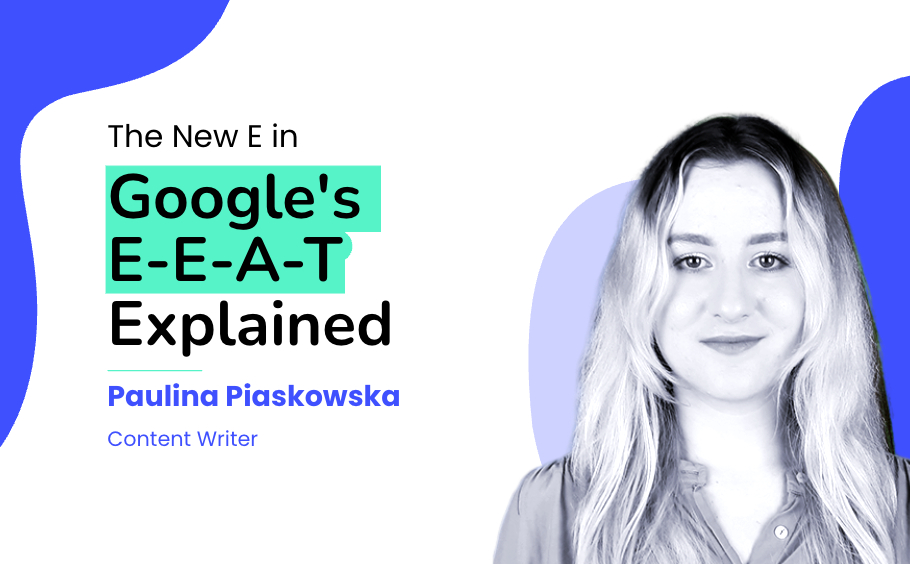Learn about Google’s new E-E-A-T acronym, which stands for Experience, Expertise, Authoritativeness, and Trustworthiness.
The New E in Google’s E-E-A-T Explained
Author: Paulina Piaskowska, Content Writer

Until recently, Expertise, Authoritativeness, and Trustworthiness were crucial factors that Google’s human quality raters used to evaluate pages’ content.
And while E-A-T is still as relevant as ever – an additional E was added by the search engine in December 2022, introducing some changes into how Google Raters evaluate the quality of the content produced by website owners.
From this article, you will learn about E-E-A-T, whether or not it concerns your website and content, and how to optimise your pages to meet this new standard.
Without further ado, this is all you need to know about E-E-A-T!
What Is E-E-A-T?
E-E-A-T, which is also referred to as Double-E-A-T, stands for Experience-Expertise-Authoritativeness-Trustworthiness.
We already have a comprehensive guide in our SEO Textbook delving deeper into E-A-T, what it means, how it is used by Google Raters, and why you should care about it.
But, in a nutshell, Experience, Expertise, Authoritativeness, and Trustworthiness are all included in Google’s Quality Raters Guidelines for their human raters. Based on these characteristics, Google Quality Raters evaluate the overall quality of your page and the content it provides.
Needless to say, pages with poor-quality content may have some trouble in reaching their audience, as Google wants to reward sites that bring real value to their visitors.
Google Raters pay attention to things like the expertise of an author, the trustworthiness of the website, and its position and reputation in an industry, among other things, in order to rate the YMYL pages and other types of pages.
Ultimately, Google is asking: is the content provided coming from a source that users can trust?
For example, if you’re searching for advice on how to fill out your tax returns, you’re more likely to trust the information if it’s coming from a reputable accounting firm or a respected finance expert.
Today we are going to focus primarily on the added E in E-A-T, which is all about Experience.
Is E-E-A-T A Ranking Factor?
Before we skip to the good part, though, it’s crucial to explain whether E-E-A-T is an official ranking factor for Google. Since we’ve established that Google places a lot of significance on E-E-A-T, it wouldn’t be so out of place to assume just that.
However, that is not the case… At least, not officially.
What Google says is that: “these guidelines are what are used by our search raters to help evaluate the performance of our various search ranking systems, and they don’t directly influence ranking. They can also be useful to creators seeking to understand how to self-assess their own content to be successful in Google Search.”
E-E-A-T is not going to determine the ranking of your site, but it still plays a vital role in understanding how Google rates content and what it wants to promote to its users.
What Does the New E Stand For?
The added E stands for Experience. But what exactly does that mean for website owners?
In this context, Google Quality Raters will consider the first-hand experience of an author in order to determine whether the content they produce is of high quality.
This is crucial when writing product reviews, which discuss products and services after being tested.
Google views useful content as content that offers real value, and the experiences of an author are not meaningless here. Quite the contrary – they can help customers make informed decisions about their purchases and choices.
So, if you’re reviewing running shoes, it’s important that you talk about your experience with them, all their qualities, cons, and pros.
If you’re giving a Tiramisu recipe, you should make it known that you’ve tried the recipe yourself.
If you’re writing a guide on what to see in the capital of Spain, it should be clear that you’ve been there and you’re sharing your best tips and real-life experiences, etc.
What Kind of Pages Does Experience Affect?
So, what pages are affected by E-E-A-T the most? I already mentioned reviews, which are pieces of content that heavily rely on the author’s personal experiences with the products or services. However, these rating guidelines cover much broader ground than only review pages.
In fact, previously E-A-T, and now E-E-A-T are applicable to almost any type of content. Experience is considered when rating Your Money Your Life pages as well as social media posts and forum discussions (source, page 62).
It’s also significant to know that, in some cases, Google does not necessarily require authors to be experts in the topics they’re covering, as long as they have this real-life, first-hand experience. While it does not apply to every topic and page, as some YMYL pages should be written by specialists, some types of information or recommendations can be made by regular users and everyday people.
You can see this clearly in examples provided for Google raters in Google’s Quality Raters Guidelines (page 28).
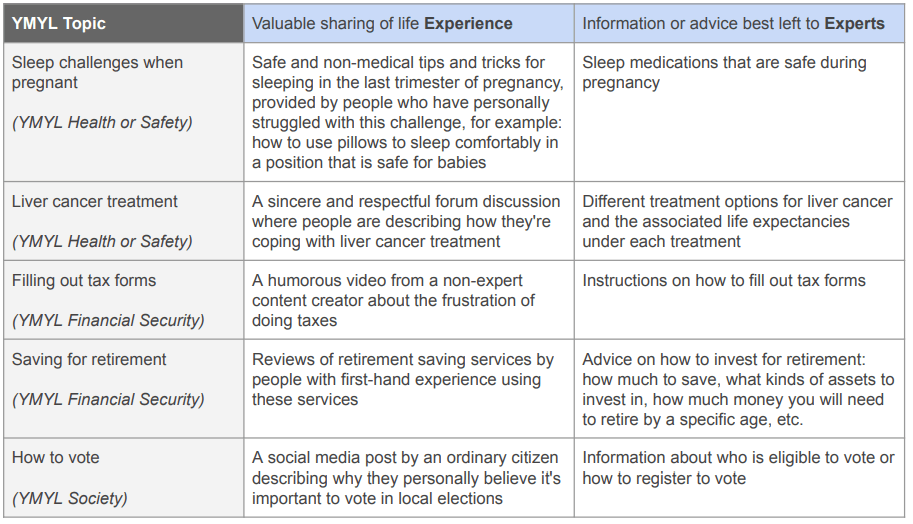
You can share your tips on how to save money and manage your budget, provided that you’ve had similar issues and you’ve learned how to overcome them, but you shouldn’t offer financial advice on what to invest in on a stock market if you’re not an expert in this field.
The Experience factor in E-E-A-T can be applied to almost any type of content, so it’s useful to consider it whenever it’s possible.
Tips on How To Demonstrate Experience
Okay, so we know that first-hand experience matters. But how exactly can you show Google that you have it and that you’re a trustworthy source of information?
Below we’ve combined 5 valuable tips on how to achieve that!
Show Your First-Hand Experience on the Topic
This seems pretty straightforward because it is.
Showing your first-hand experience means talking about how you’ve come up with the conclusions you’re presenting, talking about how you’ve tested certain products or services, what was the whole journey, and how you know the things you’re sharing.
A good example of what we’re talking about here are product reviews. As we read in Google’s QRG, “Product reviews should be honest and written to help others make informed purchasing decisions (rather than solely to sell the product).” (source, page 26).
A little further, we can also read that:
“product reviews by people who own the product and share their experiences can be very valuable and trustworthy. However, “reviews” by the product manufacturer ( “Our product is great!” ) or “reviews” from an influencer who is paid to promote the product are not as trustworthy due to the conflict of interest.” (source, page 27).
What does sharing your first-hand experiences look like in a review? It’s:
- Sharing your personal opinions about the product/service;
- Talking about the advantages and disadvantages of the product/service;
- Comparing various aspects of the product/service with other products you’ve tested;
- Sharing your experience with how the product performed in various circumstances;
- Focusing on aspects of a product/service that will be valuable for users in real life.
- Demonstrating that you’ve actually used the product/service by adding original images and videos.
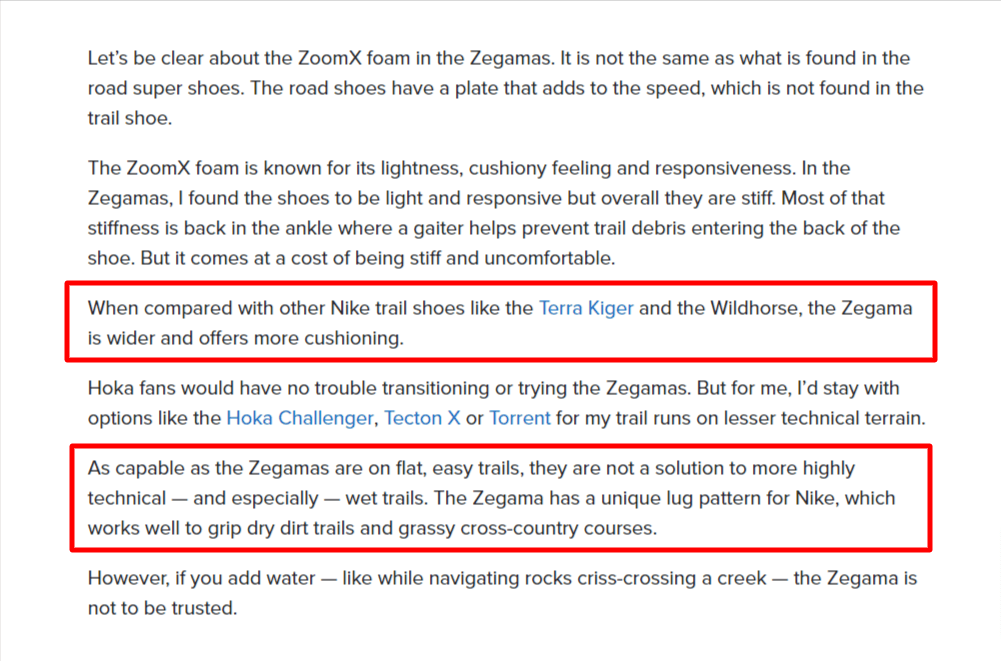
Explain How the Content Was Created
Another way to showcase your experience in a topic is by showing how your content was created, to begin with.
This serves multiple purposes, one of which is telling a story, which is really important if you want to gain the trust and attention of your readers. It also helps you present yourself as someone who knows what they’re talking about.
A good example of this can be found in this review of the new Sony WF-1000XM4 earbuds.
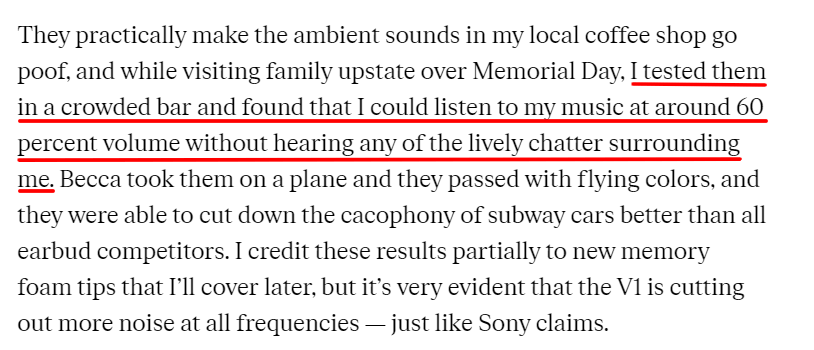
Notice how the author is talking about circumstances in which they were testing the earbuds? How people who might buy or use these earbuds will likely be using them in similar settings adds much more value to the reader.
This is a really easy element to incorporate into your review or any other type of content because you’re talking about the events and experiences you had. It increases your credibility and offers a great opportunity to let your audience know how you came to the conclusions presented in your content.
Demonstrate Your Experience in Your Author Bio & About Page
While evaluating your page, Google Raters will look for information about the author of the content. It’s helpful to include the author’s information in the Author’s Bio and About page.
This builds your trustworthiness and gives some background as to why you would be knowledgeable about a topic you’re covering. Include information about the experience of people behind the site on the About Us page to illustrate your team’s competency and show the source of the information you’re presenting to the viewers and readers.
The same goes for Author’s Bio. It’s a great place to highlight the experience that the author has in a field. It’s crucial to remember that Google cares the most about Trust, which is clearly expressed in their document for Google Raters.
By providing this information about a person who created the content on your page, you’re making sure this trust is built.
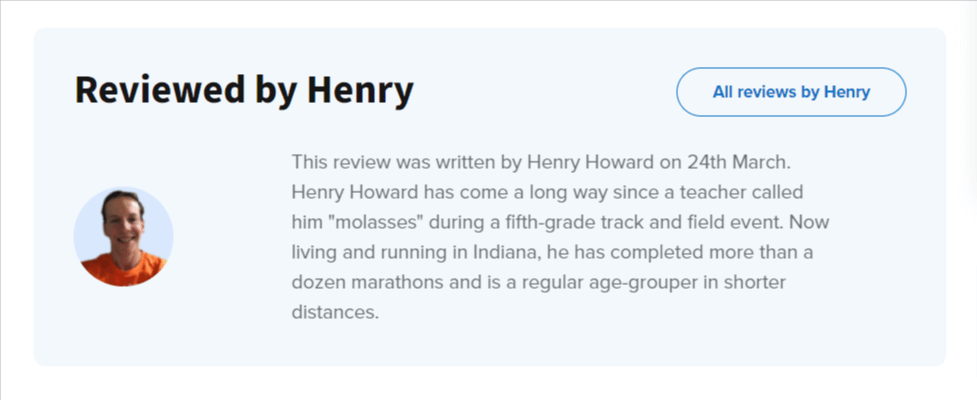
Build Your Reputation Through Online Reviews & Mentions
And since we’re talking so much about the trust and reputation of your site, we can’t forget about the importance of online reviews and mentions you get (and should be getting). As we read in the QRG, Raters are asked to:
“look for independent reviews, references, news articles, and other sources of credible information about the website or content creators. Is there independent, reliable evidence that the website or content creator is experienced, has expertise, is authoritative, or is otherwise considered trustworthy?” (source, page 27).
What other people, especially your clients, say about you matters a great deal to Google. It applies both to the site and the author of the content. This means getting positive customer reviews, addressing negative reviews and asking your customers or audience for feedback is going to help you build your reputation and improve your E-E-A-T score.
So, if you’re lacking in that department and you don’t have any reviews on your site, ask your clients to leave their feedback.
Publish Content By Authors With Experience
What is the best way to create quality and trustworthy content? Well, there are many things that you can do, one of which is to invite people with experience and expertise to write the content for you.
As I mentioned before, the reputation of an author is an important factor for E-E-A-T. If you’re not an expert yourself, it’s much better to give the stage to someone who is and can create high-quality content that brings lots of value to your audience.
This may also help you build your trustworthiness by associating with authors that already have established reputations and positions in their fields. Don’t be afraid to reach out to people who have real-life experiences and extensive knowledge of the topics you want to cover.
This is especially important for YMYL pages. If you’re going to give people advice on what to invest in or whether or not CBD oils are safe to use, it’s better that this advice comes from someone with vast knowledge, expertise and experience in these topics.
Experience Is Important, But Being Trustworthy Is Key
Experience, Expertise and Authoritativeness are all needed to establish whether or not a page is a trustworthy source of information – and that is what matters the most to Google and Google’s Quality Raters.

While the expertise of an author is often a crucial pillar in determining the quality of content, sometimes experience plays a bigger role. For example, a website focused on offering recipes for French dishes doesn’t have to be created by a French chef to be viewed as trustworthy. In this case, it’s more important for an author to have experience in cooking French cuisine because this will be enough to provide reliable information to the audience.
The difference between expertise and experience is important to recognise here. Expertise combines knowledge and experience, which is valuable when talking in-depth about topics that regard one’s health, well-being, financial standing, etc.
Experience can be obtained without expertise, and it’s something Google recognises and values as well.
Still, it all comes down to how reputable and trustworthy your site is. “Trust is the most important member of the E-E-A-T family because untrustworthy pages have low E-E-A-T no matter how Experienced, Expert, or Authoritative they may seem.” (source, page 27)
That is why you should always focus on the big picture, making sure the people who create content for it are knowledgeable and experienced. There are no shortcuts here, but the effort is worth the reward.
The Bottom Line
E-E-A-T is an important measure of quality that Google considers when working on their algorithms. This means it’s something all content creators and website owners should pay attention to.
Experience is now one of the aspects that can shine some light on how the content was created, what value it brings, and is it a reliable source of information. So, it’s worth making sure that your experience in a topic is not overlooked.
For the time being, E-E-A-T is here to stay, offering us great guidelines for how content online is being evaluated and what can influence the rankings.
More articles
View more of our research.

Constructing An eCommerce Website for SEO
Find out how to construct an eCommerce website that is great for users and accessible for search engines.

Educating Clients on the Value of SEO: A Guide for Marketing Managers
Find out how marketing professionals can transform their clients' perception of SEO by educating them about the value that it can bring to their businesses.
